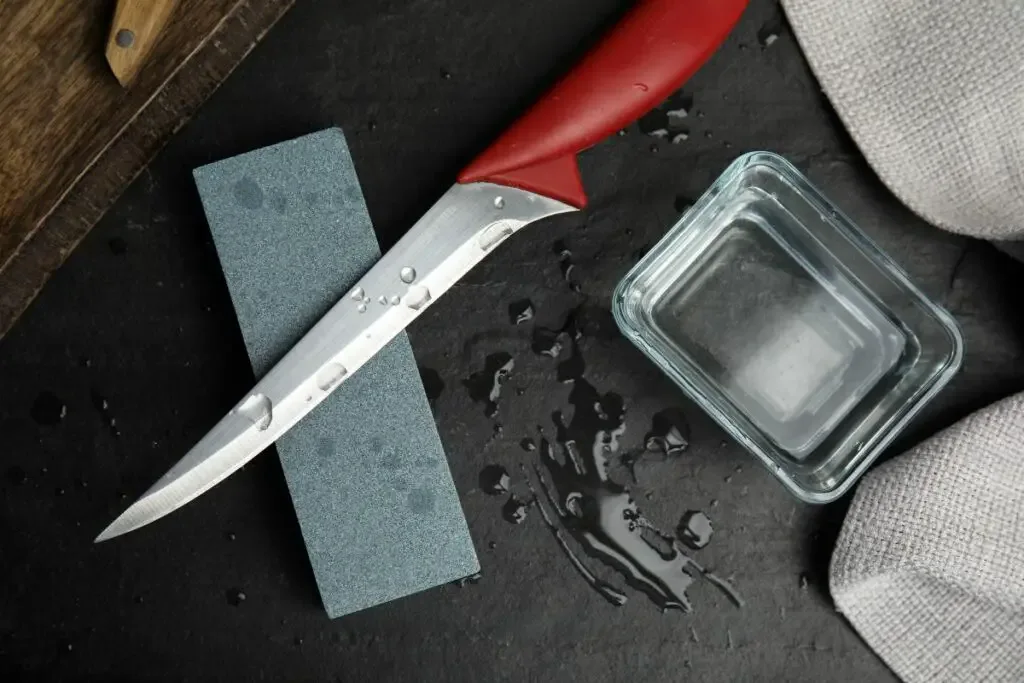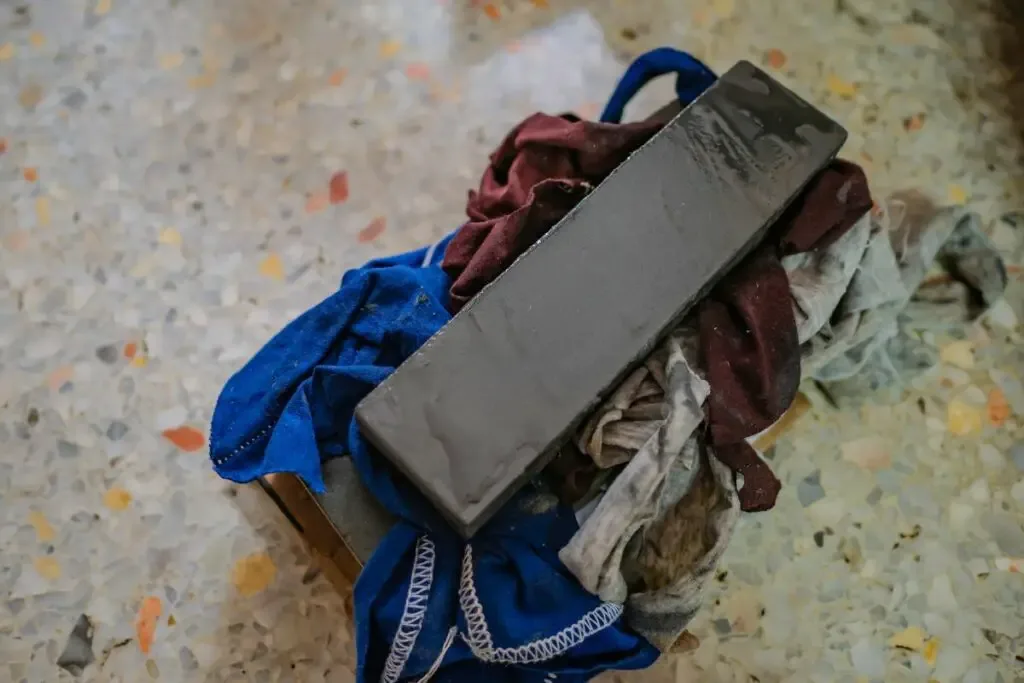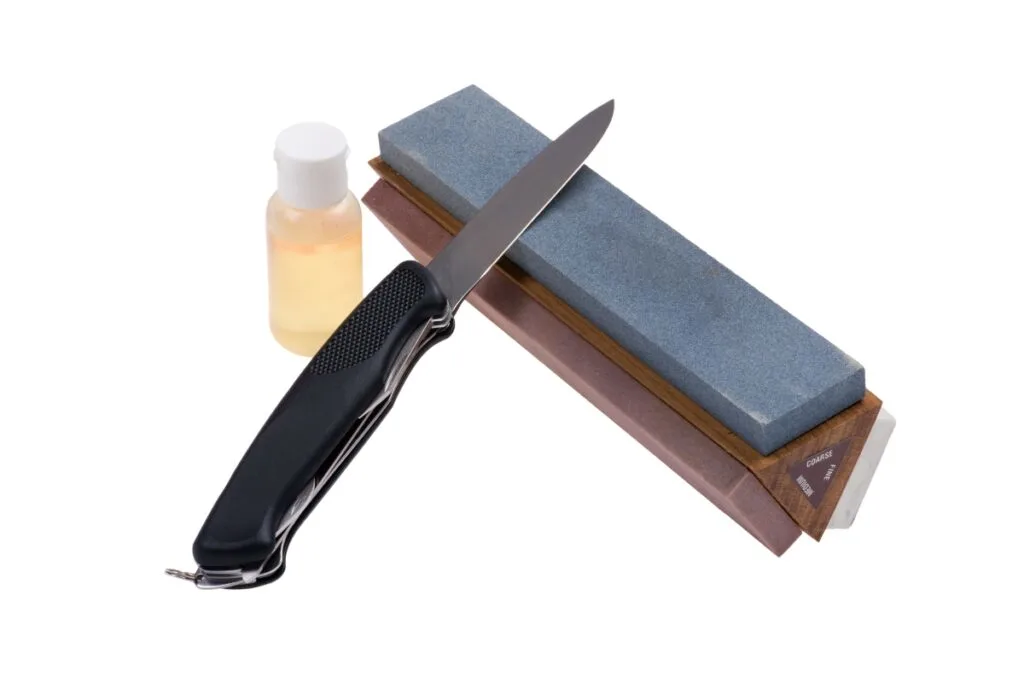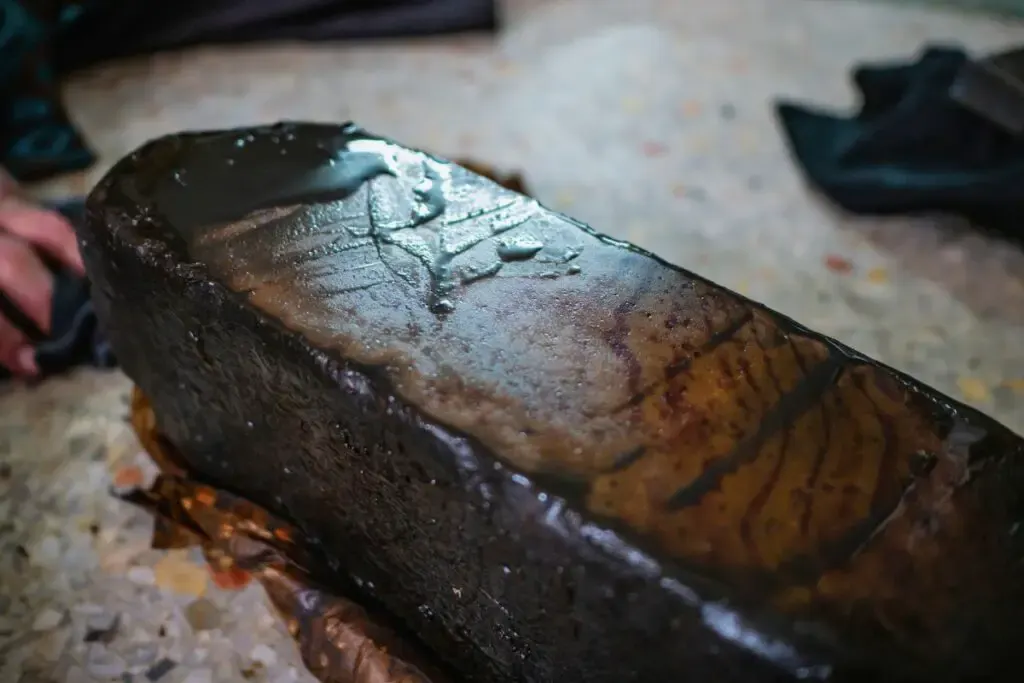As an Amazon Associate, we earn from qualifying purchases with no additional costs for you.
Knife sharpening on stones is a fairly hot topic in knife communities, with everyone giving their opinion on the best oils to use on the stones. Our discussion on the benefits of sharpening stone oils and some recommendations will help you decide for yourself which route to go.
The best sharpening oil to use with sharpening stones is one specially formulated for the task. The oil will efficiently remove the waste from the stone’s surface and keep the sharpening process efficient. The best sharpening stone oil for sharpening kitchen knives is a food-safe sharpening oil.
People new to knife sharpening may be undecided on what oil to use when sharpening a knife and whether oil is the best option. Our insight on the topic of sharpening stone oils will offer useful information about why oil is a good idea, which stones it should be used on, and the best oils to use.
If you are interested in checking out the best oil for whetstones produced by Thirteen Chefs (made in the USA) you can find them by clicking here (Amazon link).

Why Use Oil On Sharpening Stone?
Sharpening a knife on a sharpening stone is an abrasive process that grinds steel from the knife’s cutting edge. The process thins the steel at the edge, which creates a sharp edge.
Many people new to sharpening stones may consider adding a lubricant to a process where you need an abrasive, a counterintuitive measure. Why would you want to lubricate an abrasive when it should be grinding steel from the edge of a knife?
A lubricant is used on a sharpening stone due to the waste products resulting from the sharpening process. Passing steel across the sharpening stone’s surface dislodges small particles of the abrasive. The grinding process of the abrasive on the steel removes fine steel particles from the edge of the knife.
The combination of the abrasive particles and fine steel particles is known as swarf and coats the upper surface of the stone during the knife sharpening process.
If these fine particles are not removed, they fill in the gaps between the abrasive peaks on the stone, smoothing out the abrasive surface.
This waste layer reduces the sharpening stone’s cutting or steel removal effectiveness and causes the stone to lose effectiveness in sharpening the knife.
Adding a lubricant, such as oil or water, to the sharpening stone surface performs two main functions. The first function of the lubricant is to lift the abrasive and steel particle waste from the sharpening stone’s surface.
The particles are small enough to be held in suspension in the lubricant, which then is effectively “washed” off the stone’s surface with the movement of the knife across the stone.
The second purpose of the lubricant is to absorb heat from the knife’s cutting edge. The sharp edge of a knife is very thin and has the potential to heat up quickly when scraped across the abrasive surface of a sharpening stone.
The heat build-up in the thin steel on the cutting edge can ruin the steel’s temper and soften it to the point that it does not hold an edge very well. The lubricant works to dissipate the heat build-up, preventing it from becoming a problem for the steel.
The two main lubricants used on sharpening stones are water and oil. So, which lubricant should you use on your sharpening stones?
TIP: Understanding whetstone grit levels can be a little confusing at first. Our guide to whetstone grits and their levels in the article below will help clear up misconceptions:
Complete GUIDE About Whetstone Grit: Levels & What To Buy
Is Oil Or Water Better For Sharpening Stone?

There are two main contributing factors to determining the best lubricant to use on your knife sharpening stones.
The first and most important consideration is the type of sharpening stone. Certain sharpening stones are called water stones, and the composition of the stone and the crystals in the abrasive work best with water as a lubricant.
An example of these types of stones is Japanese Waterstones, which are expensive, highly efficient sharpening stones. Using oil on these stones will clog the pores in the stone, effectively ruining an expensive sharpening stone.
In contrast, other stones are only designed to be used with oil lubricants. Using water on these stones will limit their effectiveness and may damage the sharpening stone.
The second consideration in choosing a lubricant is your personal preference. However, this option is only available if your sharpening stones can be used with oil or water as a lubricant.
Some sharpening stones can be used with water or oil, depending on your personal preference. However, when you make a selection and use a particular lubricant on a stone, you have to stick with that lubricant for the duration of the stone’s life.
You cannot use oil on a sharpening stone for one sharpening session and then use water for the next. This will cause the stone’s pores to clog and reduce the sharpening stone’s life and effectiveness.
The type of steel used to make your knife can influence your choice of sharpening lubricant. High-carbon steel knives can develop rust spots surprisingly fast. You can sometimes see rust developing on these knives during the sharpening process when water is used as the lubricant.
While this rust is not severe and can be removed easily after sharpening when the knife is washed and oiled, it is still a risk. High-carbon steel knives would benefit from an oil lubricant that coats the steel and prevents rust from developing during sharpening.
Stainless steel knives are less susceptible to rust and can be used with either water or oil as the sharpening lubricant.
TIP: Some whetstones are sometimes referred to as water stones because water is used in conjunction with them. Find out more about using water and whetstones in the article below:
Can You Leave A Whetstone In Water? All You Need To Know
What Kind Of Oil To Use For A Sharpening Stone?

If you have chosen oil as the lubricant of choice for your sharpening stone, or if your sharpening stone can only use oil, you have some choices available on the type of oil you can use on your stone.
There are several choices available, but you need to consider some of the oil characteristics in order to choose the best oil for your sharpening stones.
Not all oils are suitable for use on a sharpening stone. Many people with kitchen knives want to use a food-safe oil for knife sharpening to prevent cross-contamination of the sharpening oil on the food ingredients.
This leads many inexperienced people to try using vegetable oils on their sharpening stones. Vegetable oils tend to harden and turn rancid in a short time. Using these oils on your sharpening stones will clog the pores and the abrasive material with a sticky, gooey mess. The stone will also start to stink as the oil degrades and turns rancid.
The best oil to use on a sharpening stone is an oil that is specially formulated for the task. These oils will have the right viscosity and offer protection to the knife steel. Many of these oils are also food-safe, making them safe for your kitchen knives.
Best Oils for Sharpening Stones

The best oils to use on your oil stones for knife sharpening are commercially formulated products that you can trust to produce consistent results and not cause damage to your sharpening stones.
Using a tried and tested product takes the guesswork and the trial-and-error risk out of trying an unknown oil. You do not want to try out an unknown oil on an expensive sharpening stone and ruin the stone.
We have selected two oils for sharpening stones that we can recommend as excellent products to use for your knife sharpening.
Best Pick: Thirteen Chefs Knife and Honing Oil
Thirteen Chefs is a company that was started by a group of professional chefs who were struggling to source kitchen tools made from sustainable materials rather than disposable materials that end up in landfills.
These artificial products can also pose a health hazard in the kitchen for the chefs and the customers in the restaurants. In the spirit of this philosophy, the company produces a food-safe knife and honing oil.
Designed for use in the kitchen, the Thirteen Chefs Knife And Honing Oil (Amazon link) contains no toxic ingredients. It is odorless and tasteless, which eliminates transferring any unsavory flavors to the food after a knife has been sharpened with this oil as a lubricant.
This honing oil is specially formulated with the correct viscosity to effectively lift the swarf from the whetstone’s surface and maintain the effectiveness of the abrasive. This produces faster, more effective sharpening and reduces unnecessary wear on the knife during the sharpening process.
The oil is created to be used as a general protective coating for all your kitchen knives. After washing your knives, place a drop of the oil on the blade and spread it in a thin, even layer across the steel with a soft cloth.
This provides an effective moisture barrier to protect even high-carbon steel knives from corrosion in a commercial kitchen’s hot, humid environment.
This sharpening oil is made entirely in the USA and is highly recommended as an ideal sharpening oil and general maintenance oil to prevent corrosion on the steel.
TIP: Check out the latest price for Thirteen Chefs Sharpening Oil on Amazon here.
Alternative: Victorinox Kitchen Sharpeners Pharmacopeia Grade Mineral Oil
Victorinox is the world-renowned maker of the Swiss Army knife and a superb range of kitchen knives. It is safe to say that the company knows a little about knife care and sharpening!
Even though this sharpening stone oil is marketed and sold by Victorinox, it is made by Norton, a company known for its high-quality sharpening stones.
The Victorinox/Norton Sharpening Oil (Amazon link) is made for use on all knife types, including kitchen knives. The product is non-toxic and food-safe, making it perfect to use for sharpening kitchen knives.
It can also be used as a general-purpose oil to protect your knives from corrosion after washing or for long-term storage.
To sharpen your knives, pour a small pool of oil on the stone and spread it evenly over its surface. During the sharpening process, periodically wipe the surface of the stone with a clean, soft cloth and re-apply a fresh coating of oil.
This oil is not only for knives but can be used as a general-purpose household oil to lubricate castors, sewing machines, door hinges, and power tools.
TIP: Check out the latest price for Victorinox/Norton Sharpening Oil on Amazon here.
What Can I Use Instead Of Honing Oil
Many people try to use oils other than honing oil on sharpening stones. While some of these options may work in the short term, there is a risk of causing serious long-term damage to your sharpening stones.
This could result in costly sharpening stones being damaged beyond repair and requiring replacement. Once the incorrect oil has penetrated deep into the stone, removing it from the stone and restoring it to its original state is almost impossible.
TIP: One of the important maintenance tasks is flattening the sharpening stones. Check out the best and the most effective ways how to flatten your whetstones in the article below:
4 Proven Ways: How To Flatten Sharpening Stone (Whetstone)
Can I Use WD-40 on My Sharpening Stone
WD-40 is not a lubricant, even though it has lubricating properties. It is designed to be a water displacement fluid rather than a lubricant. Many people use WD-40 (Amazon link) incorrectly because it has lubricating and rust removal properties, but does it work for sharpening stones?
WD-40 is too thin and light to use on a sharpening stone. The viscosity of the WD-40 is not sufficient to lift the waste material off the stone’s surface and carry it away.
As a result, WD-40 can not remove the swarf from the stone, which will clog the abrasive and cause the stone to become more inefficient as you sharpen your knife.
Consequently, WD-40 is not recommended as a suitable lubricant for a sharpening stone. The key factor to remember about oil for sharpening stone is not to reduce friction but to transport the swarf away from the stone’s surface during the sharpening process.
Can You Use Motor Oil on a Sharpening Stone
Motor oil is another lubricant that many people try to use as a sharpening stone lubricant, but this is not a good idea for several reasons.
Some people try to re-purpose used motor oil as a sharpening stone oil. Used motor oil contains small metal fragments from the car’s engine. Using old motor oil on your stone adds waste material to the stone’s surface rather than removing it.
So, can you use fresh motor oil on your sharpening stones? Motor oil, in general, is also too viscous to use on a sharpening stone and will clog the stone.
Motor oil is also not food safe, making it unsuitable for use when sharpening knives used for food preparation.
FAQs About Sharpening Stones and Oils

Q: Can I use olive oil on a sharpening stone?
A: It’s not recommended to use olive oil or other cooking oils on sharpening stones. These oils can harden and turn rancid over time, leading to a sticky residue on the stone and potentially affecting its performance. It’s best to use oils specifically formulated for sharpening stones.
Q: How often should I oil my sharpening stone?
A: The frequency of oiling your sharpening stone depends on how often you use it. Generally, you should apply oil each time you use the stone to ensure it maintains its effectiveness. The oil helps to lift and remove metal filings and debris from the stone’s surface.
Q: What are the benefits of using oil on a sharpening stone?
A: Using oil on a sharpening stone helps in two main ways. First, it acts as a medium to remove the swarf (metal filings and stone particles) from the stone’s surface, keeping it effective. Second, it helps in heat dissipation, protecting the knife’s edge from overheating and losing its temper during sharpening.
Q: Can I switch between oil and water on the same sharpening stone?
A: It’s not advisable to switch between oil and water on the same sharpening stone. Once a type of lubricant is used, it should be consistently used for the lifespan of the stone. Switching lubricants can lead to clogging and reduced effectiveness of the stone.
Q: Are there any alternatives to commercial sharpening stone oils?
A: While commercial sharpening stone oils are recommended for their specific formulation, in a pinch, you can use mineral oil as an alternative. It’s important to avoid oils that can spoil or clog the stone’s pores, such as vegetable-based oils.
Q: Can I use motor oil or WD-40 on my sharpening stone?
A: Motor oil and WD-40 are not suitable for sharpening stones. Motor oil is too viscous and can clog the stone, while WD-40, being a water displacement product, does not have the right properties to effectively remove swarf from the stone.
Q: How do I clean my oil-soaked sharpening stone?
A: To clean an oil-soaked sharpening stone, gently scrub it with a soft brush or cloth and a mild detergent. Rinse thoroughly with warm water. For deeper cleaning, you can use a stone cleaner specifically designed for oil-soaked stones.
Q: What is the difference between natural and synthetic sharpening stones, and does the choice of oil differ for each?
A: Natural sharpening stones, often made from quarried stone, and synthetic stones, manufactured from bonded abrasives, have different characteristics. Natural stones generally work best with lighter oils, as they have a more intricate pore structure.
Synthetic stones are often less porous and can be used with a wider range of oils. However, always refer to the manufacturer’s recommendations for the best results.
Q: Can I use baby oil as a lubricant for my sharpening stone?
A: Baby oil, which is essentially a form of mineral oil, can be used as a lubricant for sharpening stones. It is light, non-toxic, and won’t solidify or gum up the stone’s surface. However, for optimal performance, especially with high-end stones, it’s advisable to use professional-grade sharpening stone oils.
Conclusion
The right sharpening oil used on a sharpening stone can make the difference between an effective and efficient sharpening process or ruining the stone completely. The best option is sharpening or honing oil specially formulated to remove the swarf on the stone and keep the stone’s cutting ability consistent.
The right oil on your sharpening stone will not only make sharpening knives easier, but it will protect your knives from corrosion and extend the life of your sharpening stones.
TIP: Some whetstones can be fairly pricey, so it makes sense to take care of these items to preserve their lifespan and keep them functional for longer. Find out more in the article below:
Buyer’s Guide: The Best Whetstone Holders & Storage Boxes

